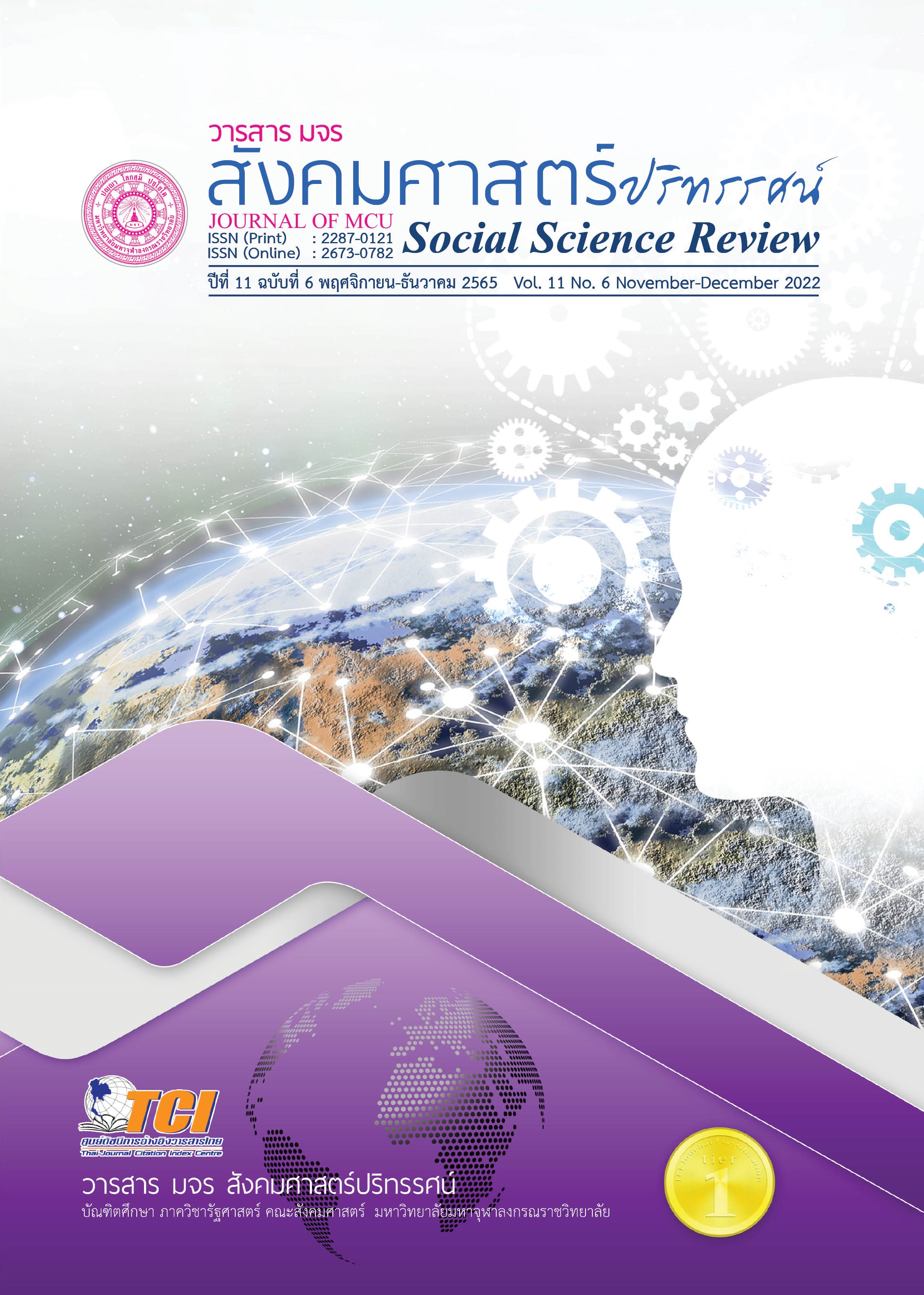รูปแบบพุทธบูรณาการพัฒนาทุนมนุษย์ขององค์กรปกครองส่วนท้องถิ่น ในจังหวัดนครราชสีมา
คำสำคัญ:
พุทธบูรณาการ, พัฒนาทุนมนุษย์, องค์กรปกครองส่วนท้องถิ่นบทคัดย่อ
บทความวิจัยนี้มีวัตถุประสงค์เพื่อ ศึกษา วิเคราะห์และตรวจสอบความสอดคล้องของรูปแบบพุทธบูรณาการพัฒนาทุนมนุษย์ โดยเป็นการวิจัยเชิงปริมาณ กำหนดขนาดของกลุ่มตัวอย่าง จำนวน 470 คน จากบุคลากรส่วนท้องถิ่นในจังหวัดนครราชสีมา โดยใช้แบบสอบถาม ซึ่งมีค่าความเชื่อมั่นทั้งฉบับเท่ากับ .996 วิเคราะห์ข้อมูลโดยใช้สถิติเชิงพรรณนา และวิเคราะห์รูปแบบความสัมพันธ์โครงสร้างเชิงเส้นด้วยโปรแกรมสำเร็จรูปทางสังคมศาสตร์
ผลการวิจัยพบว่า 1. ค่าสถิติ Bartlett's Test of Sphericity เท่ากับ13484.878 (p = .000) มีนัยสำคัญทางสถิติที่ระดับ .01 และ ค่า KMO มีค่าเท่ากับ .914 2. รูปแบบพุทธบูรณาการพัฒนาทุนมนุษย์ที่พัฒนาขึ้นสอดคล้องกลมกลืนกับข้อมูลเชิงประจักษ์ โดยพิจารณาจาก χ2 มีค่าเท่ากับ 29.71, df เท่ากับ 19, p – value เท่ากับ .055, GFI มีค่าเท่ากับ .992 , AGFI มีค่าเท่ากับ .944, SRMR มีค่าเท่ากับ .013 ได้รับอิทธิพลทางตรงจากปัจจัยด้านสมรรถนะ, วิธีการพัฒนาและปัจจัยแห่งความสำเร็จ โดยมีขนาดอิทธิพลเท่ากับ 0.46, 0.29 และ 0.21 อย่างมีนัยสำคัญทางสถิติที่ระดับ .01 ตามลำดับ และได้รับอิทธิพลทางอ้อมจากปัจจัยด้านสมรรถนะและวิธีการพัฒนาผ่านตัวแปรปัจจัยแห่งความสำเร็จ โดยมีขนาดอิทธิพลเท่ากับ 0.12 และ0.08 ตามลำดับ นอกจากนั้น ตัวแปรปัจจัยแห่งความสำเร็จยังได้รับอิทธิพลทางตรงจากปัจจัยด้านสมรรถนะและวิธีการพัฒนา โดยมีขนาดอิทธิพลเท่ากับ 0.75 และ 0.38 ตามลำดับ อย่างมีนัยสำคัญทางสถิติที่ระดับ .01
เอกสารอ้างอิง
กีรติ ยศยิ่งยง. (2549) การวางแผนการพัฒนาทรัพยากรมนุษย์เชิงกลยุทธ์ พิมพ์ครั้งที่2. กรุงเทพฯ: บริษัท มิสเตอร์ ก๊อปปี๊ ประเทศไทย.
คนึงนิจ อนุโรจน์. (2551). ปัจจัยที่มีอิทธิพลต่อสมรรถนะของนักพัฒนาทรัพยากรมนุษย์ กองทัพอากาศ (ปรัชญาดุษฎีบัณฑิต สาขาพัฒนาทรัพยากรมนุษย์) กรุงเทพฯ: มหาวิทยาลัยรามคำแหง.
จรัสศรี จินดารัตนวงศ์. (2553). การพัฒนารูปแบบการฝึกอบรมทางการศึกษานอกระบบโรงเรียนตาม แนวคิดการเรียนรู้เพื่อสร้างสรรค์ด้วยปัญญาและการเรียนรู้ด้วยการนำตนเองเพื่อเสริมสร้างสมรรถนะในการปฏิบัติงานของข้าราชการสายงานกำลังพลกองทัพอากาศ (ครุศาสตรดุษฎีบัณฑิต สาขาวิชาการศึกษานอกระบบ โรงเรียน). กรุงเทพฯ: จุฬาลงกรณ์มหาวิทยาลัย.
จิรประภา อัครบวร. (2552). คุณค่าคนคุณค่างาน. กรุงเทพฯ: สำนักพิมพ์ เต๋า 2000
เจษฎา นอกน้อย. (2552). แนวคิดการบริการทรัพยากรมนุษย์ร่วมสมัย. กรุงเทพฯ: สํานักพิมพ์แห่งจุฬาลงกรณ์มหาวิทยาลัย.
ณัฐชนันตร์ อยู่สีมารักษ์. (2557). รูปแบบการพัฒนาทรัพยากรมนุษย์ตามหลักพุทธธรรมของสถานศึกษาของ รัฐสังกัดกรุงเทพมหานคร (พุทธศาสตรดุษฎีบัณฑิต สาขารัฐประศาสนศาสตร์). พระนครศรีอยุธยา: มหาวิทยาลัยมหาจุฬาลงกรณราชวิทยาลัย.
ดนัย เทียนพุฒ. (2553). ทุนมนุษย์จัดการให้ดีสู่ดีเลิศ. กรุงเทพฯ: โครงการฮิวแมนแคปปิตอล.
ธำรงศักดิ์ คงคาสวัสดิ์. (2550). ทุนมนุษย์ การกำหนดตัวชี้วัดเพื่อการพัฒนา. กรุงเทพฯ: สมาคม ส่งเสริมเทคโนโลยี ไทย-ญี่ปุ่น.
นงลักษณ์ วิรัชชัย. (2552). วิจัยและสถิติ: คำถามชวนตอบ. กรุงเทพฯ: ภาควิชาวิจัยและจิตวิทยาการศึกษา คณะครุศาสตร์ จุฬาลงกรณ์มหาวิทยาลัย.
พระครูปลัดสมชาย อภิวณฺโณ (เฮาลี้). (2557). พุทธบูรณาการเพื่อการพัฒนาสมรรถนะองค์การบริหารส่วนตำบล. วารสารวิทยาลัยนครราชสีมา. 8(1), 8-10.
พินิจ อุไรรักษ์. (2553). ผลการใช้รูปแบบการจัดกิจกรรมพัฒนาผู้เรียนโดยใช้กระบวนการวิจัยที่มีต่อการ คิดอย่างมีวิจารณญาณ การใฝ่รู้และเจตคติต่อกิจกรรมพัฒนาผู้เรียน (ปรัชญาดุษฎีบัณฑิตทางสังคมศาสตร์ สาขาวิจัยการศึกษา). กรุงเทพฯ: มหาวิทยาลัยรามคำแหง.
วันชัย สุขตาม. (2555). การพัฒนาทุนมนุษย์วิถีพุทธในยุคโลกาภิวัตน์ (รัฐประศาสนศาสตร์ดุษฎีบัณฑิต สาขารัฐประศาสนศาสตร์). ปทุมธานี: มหาวิทยาลัยราชภัฏวไลยอลงกรณ์ ในพระบรมราชูปถัมภ์.
วีรชัย อนันต์เธียร. (2557). กลยุทธ์การพัฒนาจริยธรรมสำหรับเยาวชนไทย (พุทธศาสตรดุษฎีบัณฑิต สาขารัฐประศาสนศาสตร์). พระนครศรีอยุธยา: มหาวิทยาลัยมหาจุฬาลงกรณราชวิทยาลัย.
ศิริกร ไชยสิทธิ์ และวิสุทธิชัย ไชยสิทธิ์. (2552). การพัฒนาสมรรถภาพของเจ้าหน้าที่ธุรการมหาวิทยาลัยมหาจุฬาลงกรณราชวิทยาลัย (รายงานการวิจัย). เชียงใหม่: มหาวิทยาลัยมหาจุฬาลงกรณราชวิทยาลัย วิทยาเขตเชียงใหม่
สุทธญาณ์ โอบอ้อม. (2557). การพัฒนาศักยภาพบุคลากรขององค์กรปกครองส่วนท้องถิ่น ตามแนวพระพุทธศาสนา (พุทธศาสตรดุษฎีบัณฑิต สาขารัฐประศาสนศาสตร์). พระนครศรีอยุธยา: มหาวิทยาลัยมหาจุฬาลงกรณราชวิทยาลัย.
ดาวน์โหลด
เผยแพร่แล้ว
รูปแบบการอ้างอิง
ฉบับ
ประเภทบทความ
สัญญาอนุญาต
ลิขสิทธิ์ (c) 2022 วารสาร มจร สังคมศาสตร์ปริทรรศน์

อนุญาตภายใต้เงื่อนไข Creative Commons Attribution-NonCommercial-NoDerivatives 4.0 International License.
เพื่อให้เป็นไปตามกฎหมายลิขสิทธิ์ ผู้นิพนธ์ทุกท่านต้องลงลายมือชื่อในแบบฟอร์มใบมอบลิขสิทธิ์บทความให้แก่วารสารฯ พร้อมกับบทความต้นฉบับที่ได้แก้ไขครั้งสุดท้าย นอกจากนี้ ผู้นิพนธ์ทุกท่านต้องยืนยันว่าบทความต้นฉบับที่ส่งมาตีพิมพ์นั้น ได้ส่งมาตีพิมพ์เฉพาะในวารสาร มจร สังคมศาสตร์ปริทรรศน์ เพียงแห่งเดียวเท่านั้น หากมีการใช้ภาพหรือตารางหรือเนื้อหาอื่นๆ ของผู้นิพนธ์อื่นที่ปรากฏในสิ่งตีพิมพ์อื่นมาแล้ว ผู้นิพนธ์ต้องขออนุญาตเจ้าของลิขสิทธิ์ก่อน พร้อมทั้งแสดงหนังสือที่ได้รับการยินยอมต่อบรรณาธิการ ก่อนที่บทความจะได้รับการตีพิมพ์ หากไม่เป็นไปตามข้อกำหนดเบื้องต้น ทางวารสารจะถอดบทความของท่านออกโดยไม่มีข้อยกเว้นใดๆ ทั้งสิ้น





